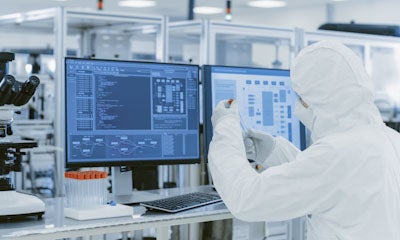
Contract development and manufacturing organisations (CDMOs) worldwide are facing a multitude of challenges, which are heightened considerably in oncology by the growing complexities.
Globally, many health authorities are increasing requirements on compliance and quality, with differing requirements across regions – which creates further complexities in cross-border operations. At the same time, trade tensions and tariff shifts threaten to drive up the cost of raw materials and components, squeezing international supply chains.
Adding to these pressures is the surging demand for specialised capabilities as oncology drug development moves towards more complex therapies that require technical manufacturing expertise. This is particularly evident in the rise of antibody-drug conjugates (ADCs), which combine the specificity of antibodies and the potency of cytotoxic drugs.
The ADCs market growth is considerable. In 2011, the market was worth an estimated $50m. Yet by 2023, the market value had risen to $9.2bn. This growth is projected to continue, with GlobalData estimating the market will achieve a value of $40bn by 2020. This is driven by a wave of approved ADC therapies such as Enhertu, Kadcyla, Padcev, and Trodelvy, which have proven their clinical and commercial potential.
However, manufacturing ADCs requires expertise in large-molecule biologics and high-potency small molecules, along with specialised conjugation chemistry. Manufacturing challenges include producing the monoclonal antibody, synthesising the highly potent payload and chemically conjugating materials with strict controls, as well as handling toxic substances under high safety protocols.
Meeting demand for specialised ADCs
The ADC pipeline is expanding and becoming more complex with innovations such as bispecific ADCs. Therefore, CDMOs must adapt rapidly to trends in ADCs.
The growing number of highly potent new chemical entities (NCEs) in oncology and the rise of ADCs and other targeted modalities are driving demand for specialist CDMOs.
CDMOs capable of handling innovations such as new payload-linker technologies are critical to ensure that scientific breakthroughs translate into effective real-world treatments.
Pharma companies are looking for partners who can handle high-potency active pharmaceutical ingredients (HPAPIs), perform intricate bioconjugations, and support the integrated supply of critical components.
Indena is a leading CDMO that exemplifies how to stay ahead of the curve amid a rapidly changing landscape. The company is investing in specific capacities and capabilities required for this new class of bioconjugate molecules.
Indena has a long history of producing active pharmaceutical ingredients under GMP conditions, from the clinical (I, II, III) to the commercial phases, and combines that expertise with world-class containment facilities for HPAPIs. This means Indena can handle substances of extreme cytotoxicity with robust safety measures, which is an essential requirement for ADC payloads.
Crucially, Indena secures the supply chain for critical materials by producing toxins and intermediates internally. This reduces the risk of delays caused by third-party issues.
Indena’s current focus is the payload-linker – the warhead bearing the chemical bridge to link the payload to the antibody. In addition, Indena’s specialist capabilities include in-house high-containment synthesis, microbial fermentation, chromatography, and lyophilisation, to produce stable payload-linker systems.
Investing in infrastructure and talents for ADC manufacturing
Over the past few years, Indena has been upgrading its facilities and onboarding talented researchers and staff to meet growing client needs in oncology.
The company’s upgraded kilolabs enable the processing of highly potent molecules at an occupational exposure limit (OEL) of 1ng/m³, including the installation of a custom high-containment freeze dryer, enabling safe development of cytotoxic payloads.
The strategic investments to expand specialist capabilities go further. Indena is also installing a larger commercial freeze-drying line to support later-stage and commercial production geared toward ADC projects. By achieving ultra-tight containment and adding capacity, Indena can produce the payload-linker component of ADCs at any scale.
Alongside scaling up production, Indena expanded its R&D labs dedicated to HPAPI R&D activities and is improving its manufacturing capabilities. The company’s main GMP plant is undergoing staged expansions to upgrade reaction and synthesis capacity and accommodate larger batches of HPAPIs. Alongside this, new equipment such as contained centrifuges, glove-box reactor loading stations, and a hydrogenator has broadened the range of possible chemistries under safe conditions.
Always looking ahead and never standing still, Indena’s plans for 2026 include additional production lines dedicated to highly potent molecules (OEB 5 and OEB 6), including reactors up to 100 litres housed in gloveboxes and high-capacity contained dryers.
Indena is investing in its resilience and technical capabilities to continue delivering highly specialised services.
To find out more about Indena’s capabilities, download the whitepaper below.


